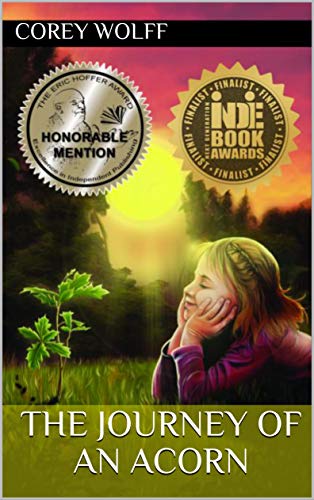
The Journey of an Acorn received a 4+ star review, making it an IndieReader Approved title.
Following find an interview with author Corey Wolff.
What is the name of the book and when was it published?
The Journey of an Acorn, published March 2019.
What’s the book’s first line?
Deep in the forest there stood an oak tree.
What’s the book about? Give us the “pitch”.
It’s about an acorn that wants to separate from an oak tree. But the tree will not let the acorn go. Rather than nurturing the acorn, the oak tree exploits its vulnerability, using it to satisfy its own needs. Although the acorn eventually breaks free of the oak tree’s hold, it faces many challenges from the trauma it experienced in early life. Despite its difficulties, it manages to persevere and to take responsibility for its own growth, helping itself and guiding its own acorns on their journey into the unknown.
What inspired you to write the book? A particular person? An event?
I read The Giving Tree by Shel Silverstein and was amazed that such a profound idea about love could be written in such a simple story. I began to think about creating an acorn as a main character, as a way to take complicated issues like mental health and abuse in the family and make them accessible, especially to children.
What’s the main reason someone should really read this book?
So many people are walking around broken from abuse or neglect in their childhood, and this cycle is perpetuated through each generation. It is an epidemic and a serious public health issue. People need to know that they have the power to stop it, and contribute to the betterment of humanity.
I want my book to begin a dialogue, to have children ask questions about how adults should be treating them, so they can ask for help if they need it. It is difficult for someone outside of the family to know if a child is experiencing emotional abuse. Often, a child doesn’t know that they are being mistreated. He or she may think that is what love is supposed to look like. I want this book to empower children. But I also want adults to reflect on the nature of their relationship with their children. Are they participating as abusers in their relationship? If so, they need to seek help, explore the reasons for their behavior, and be free of the dysfunctional patterns that have a stranglehold on them, not just for them, but for the sake of their children and for all the generations yet to come.
What’s the most distinctive thing about the main character? Who-real or fictional-would you say the character reminds you of?
The acorn has a determined spirit. Despite the many hardships and lack of support, it persists, and grows. It represents the potential in all of us to be the greatest version of ourselves. The challenges that we all face can be used as tools for self-growth, and they can present us with opportunities to unfold the greatness within all of us.
If they made your book into a movie, who would you like to see play the main character?
The best choice would be Brad Pitt. All right, I know a pit and a nut are not exactly the same, but they’re close enough for me. I picture his head superimposed on an acorn, and he would be the most handsome little guy in the forest. Brad, feel free to reach out. I am open to working with you.
Is this the first book you’ve written?
Yes. Although it’s a small book, it took me about 10 years to complete. At first I had what I believed to be a great idea. Although I had developed many notes about the acorn and the oak tree, I couldn’t complete the tale because I didn’t have the insight that I do now. After having more life experience, particularly as a father, it came together. I was able to give it the ending it needed and deserved. I don’t mind that it took 10 years; it was worth it!
What do you do for work when you’re not writing?
I teach English and writing to high school students. It’s highly rewarding work. As much as I give of myself, I get back much more. Teaching has changed me in ways that I never could have imagined.
What’s the best and the hardest part of being an indie?
I can write the book I want to write and have complete creative control. The hardest part is not getting the exposure that I know that the book deserves.
What’s a great piece of advice that you can share with fellow indie authors?
Don’t try to make your work fit into someone else’s concept of what it should be. Be true to who you are. Don’t ever compromise the integrity of the work because of what someone else thinks. I am not saying to ignore criticism or feedback. Constructive criticism is a necessary part of the process of refining your skills. But you have to evaluate that feedback, and take time to reflect on how those changes to your story will affect the work.
Would you go traditional if a publisher came calling? If so, why?
It depends. If it would require changing the story, I would turn the offer down. I don’t want to change my story to fit based on industry standards. I don’t want to cut down the words to make it work as a picture book, or add to it to make it fit into a book meant only for older children. I don’t want to focus on one theme like other children’s books in the marketplace today. I put my heart into this story, and during the process of writing it, I felt guided by a higher power. I believe the book can be helpful for others. So I would rather stay true to the story as I feel it is meant to be told.
Is there something in particular that motivates you (fame? fortune?)
Children of abuse need to know there is hope. They need to know they can turn it around and do amazing things with the life that God has given them. Not only can they improve themselves, but they can give their own children the emotional support they need to develop positive self-esteem and self- love. That is the path needed to raise the consciousness of humanity. It is within their power.
When people begin to develop self-love, they can empathize with others. Most people are highly judgmental and unforgiving, but the truth is, you don’t know what someone else’s experience has been. Life is hard, and you have no idea what has caused a person to behave or think a certain way. It could be the result of trauma, or the person could even have a disability that can’t easily be seen. A tragedy of life is that people often alienate those who need their help the most. Reach out and give someone a hand, give someone the benefit of the doubt. Try to come from a place of love, and let love guide you in all that you do.
Which writer, living or dead, do you most admire?
I have great admiration for Richard Wright. He endured great hardships and persisted as a result of his will to survive and determination to be treated with dignity. When I read his work, I feel him through the words he strung together, I feel his struggle as well as the beauty he saw in the natural world.
Which book do you wish you could have written?
Love You Forever, by Robert Munsch. It demonstrates unconditional love and how that is passed on through generations. It is truly moving and inspirational.
